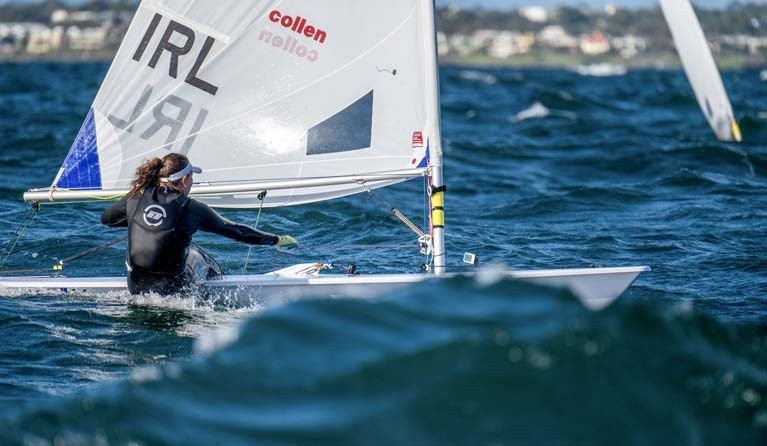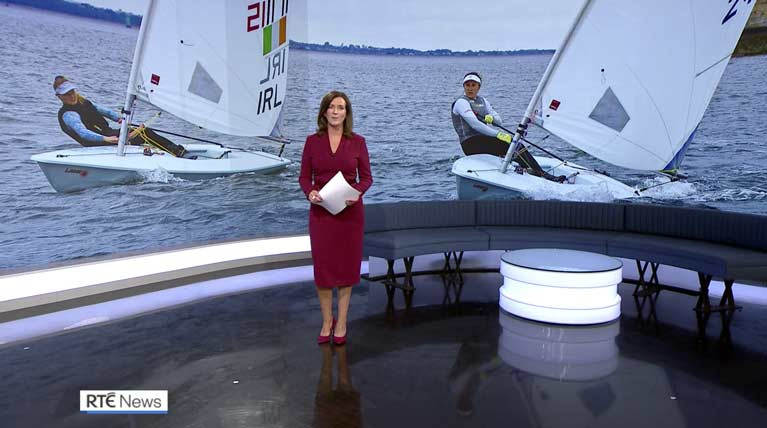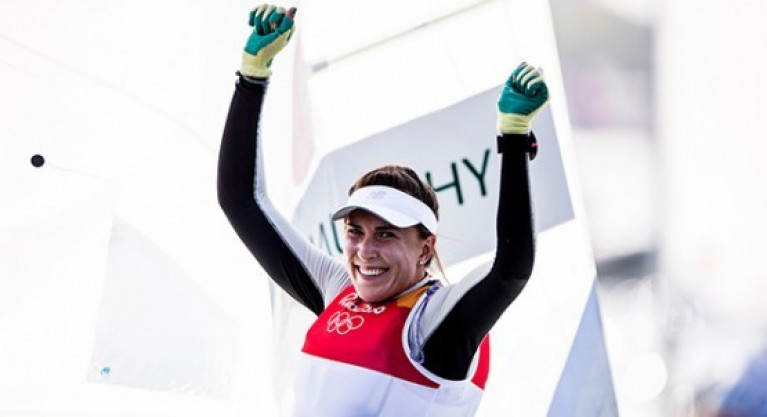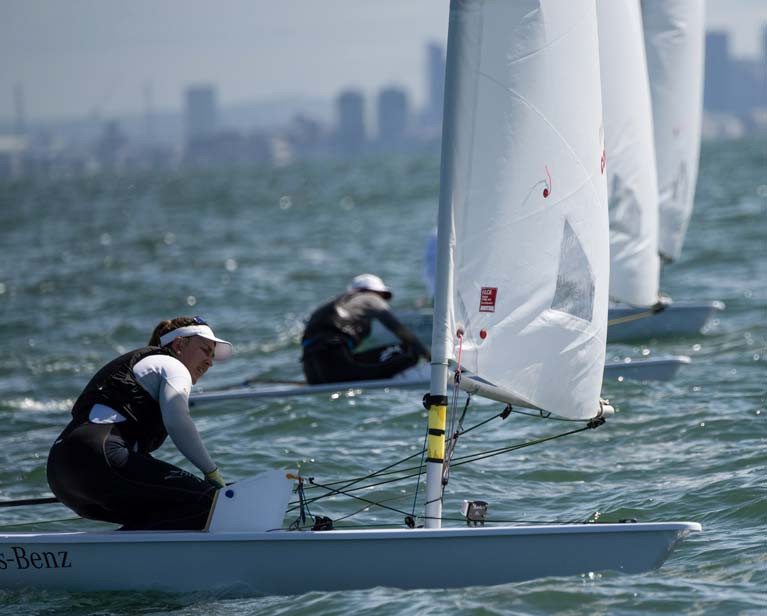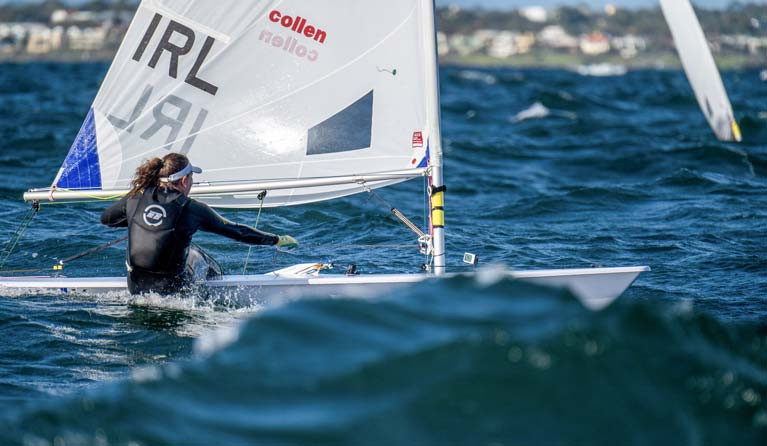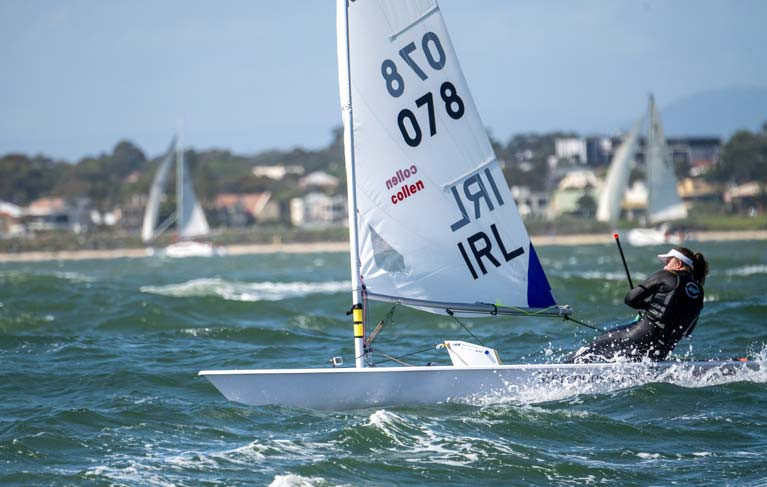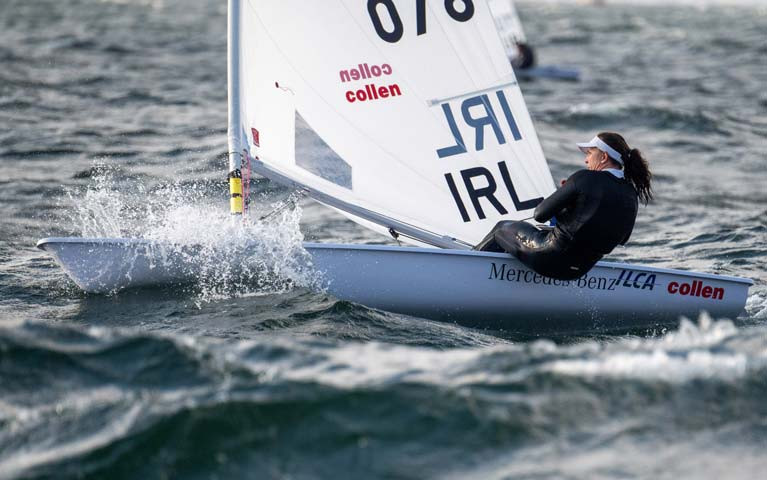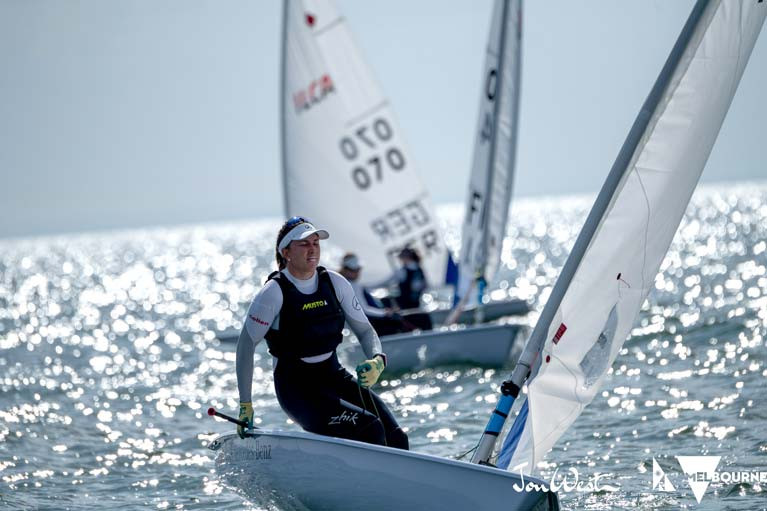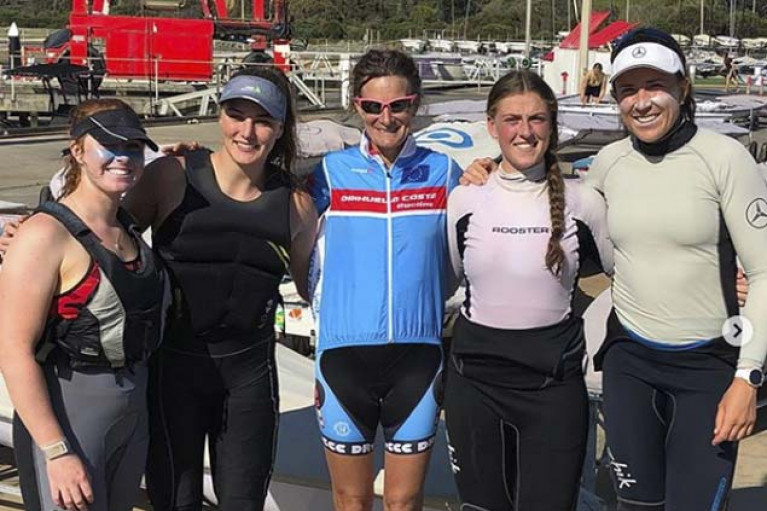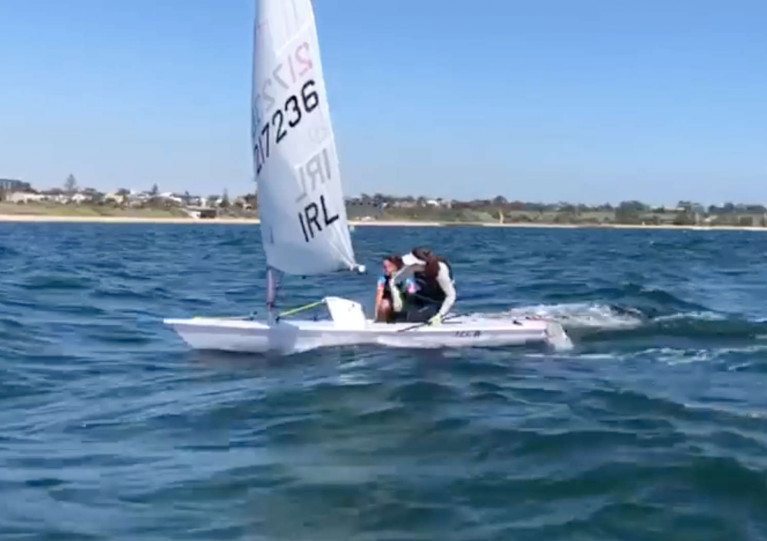Displaying items by tag: Annalise Murphy
Annalise Murphy Selected for Tokyo 2021 After Olympic Trial is Cut Short Due to Coronavirus
Rio 2016 silver medallist Annalise Murphy will be nominated in the Laser Radial to compete at the Tokyo Olympics in 2021, Irish Sailing has announced.
Murphy secured the Laser Radial nomination after the conclusion of the trials in which her three teammates Aoife Hopkins, Aisling Keller and Eve McMahon also competed.
The rivals have been given their reaction to the news here.
There were originally three scheduled trial regattas :
- ILCA Laser Radial Women’s World Championship, Melbourne, Australia (21-28 February 2020)
- Trofeo Princesa Sofia, Palma, Spain (28 March – 4 April 2020)
- Hyéres Regatta, France (18 – 25 April 2020)
Due to the ongoing Covid-19 situation, both the Palma and Hyéres events were cancelled, and the 2020 Olympics postponed until 2021. Under the selection process, if one or more of the trial regattas are cancelled, then the person with the best performance in the completed trial regattas secures the Laser Radial nomination. Annalise Murphy finished the ILCA Laser Radial Women’s World Championship in 12th place, Aoife Hopkins finished in 40th, Aisling Keller 63rd, and Eve McMahon 78th.
While uncertainty still exists as to the future international sailing calendar it is planned that the team will continue to train at home in the Dun Laoghaire Performance HQ. Aoife Hopkins is a senior carded athlete who remains a key member of the training group along with Academy sailor Eve McMahon. Aisling Keller has decided to return to college.
James O’Callaghan, Irish Sailing Performance Director commented “Annalise’s performance in the 2020 Worlds made her a clear favourite to win the scheduled trials. By nominating her now the Irish Sailing Board have ensured that team preparations can move focus to the Olympics rather than preparing for domestic trials”. He went on to say: “for sure this is tough on Aoife but she is still very young and can benefit massively from team training planned in Tokyo”.
Murphy's nomination will now be put forward to the Olympic Federation of Ireland for ratification.
Rathfarnham's Annalise Murphy from the National Yacht Club was back sailing in Dun Laoghaire Harbour today, the first time the Rio silver medalist was on the water in 55 days. Her return, in a bid for a place on the Tokyo 2021 startline, earned the sailing superstar a spot on RTE's Six One News this evening.
The Laser Radial contender went afloat as the Irish Olympic Sailing Team got back to training as part of Phase 1 of the Government’s Roadmap for Reopening.
Joining Murphy for today's training session was Howth Radial rival, Aoife Hopkins.
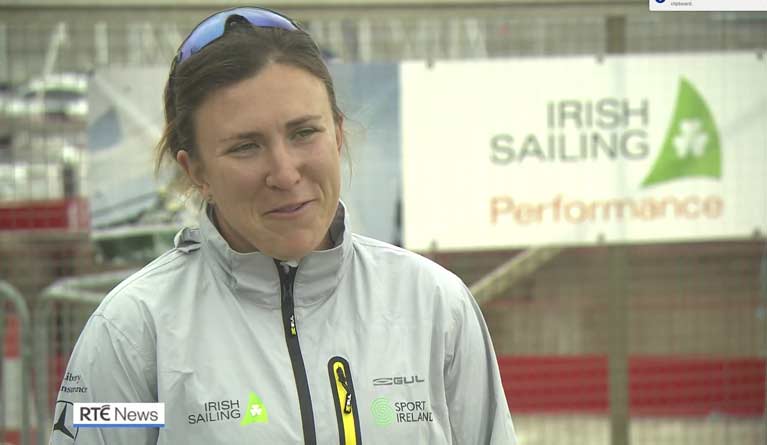 Annalise Murphy leads the Olympic trial for the Tokyo 2021 Olympic Games. Screenshot: RTE
Annalise Murphy leads the Olympic trial for the Tokyo 2021 Olympic Games. Screenshot: RTE
As Afloat reported previously, the sailors will use the Irish Sailing Performance HQ in Dun Laoghaire as their base. The PHQ containers, however, will be closed for all use except launching of boats from the pontoon.
The Irish team are now one of a handful of countries with sailing teams back on the water, including the UK, Italy and Denmark.
Harry Hermon, CEO of Irish Sailing said: “the Irish Sailing Team go back to training on the water today, and we’re working very closely together to make sure that their learnings and experiences are passed back to the sailing community, and that we all work together responsibly to ensure our safe return to the water”.
Annalise Murphy Adapts In The Time Of Coronavirus
“In my head I was going, ‘If I give up here, they’re going to be saying that Annalise The Olympian has just quit’. So I couldn’t quit.”
That’s how Annalise Murphy explains her motivation to keep up her fitness and focus for the next Olympics in the time of coronavirus, in an interview with Malachy Clerkin in The Irish Times this weekend.
The Laser Radial silver medallist was counting down the days to the Tokyo 2020 games when two months ago the world began to shut down in efforts to contain the spread of Covid-19.
Within a matter of weeks, the event she and thousands of other athletes had been working towards for months, if not years, was suddenly another year away.
And what’s more, movement restrictions prevented her from even taking to the water for training — and it’s still not entirely clear when that will resume. “I do really miss sailing right now,” she says.
In the meantime, the Irish hero of Rio 2016 has had to refocus her energies, training as much as she can at home.
But the situation, in giving her more time to think about her quest for Ireland’s reserved Laser Radial spot in Tokyo, has also had the side effect of expanding her ambitions.
“Initially, I was very much thinking I was going to retire after the Olympics,” she explains. “But after the Worlds [in February] I was going, ‘Well, I don’t know if I can retire now – I need to go and try to win a Worlds before I retire.’
The Irish Times has much more on the story HERE.
Second Yellow Flag Penalty Knocks Annalise Murphy Out of Worlds Top Ten
Annalise Murphy (NYC) retired in today’s final race of the ILCA Laser Radial World Championships in Melbourne Australia. It is understood that she received two yellow penalty flags (illegal movement Rule 42) which requires mandatory retirement. Consequently, she fell from 8th overall to 12th but she still leads the Irish Olympic selection trials by 28 points over (Aoife Hopkins) HYC who finished 40th overall.
In the silver fleet, Aisling Keller (LDYC) was 14th in the final race and 54th overall, while Eve McMahon (HYC) was black flagged and finished up in 78th position.
The trials now move back to Europe to Palma’s Princesa Sofia regatta at the end of March.
Murphy will be hoping for a continuation of the stronger breezes that she enjoyed in Melbourne, while her competition will want to see more typical lighter winds.
Full results here
It may have been a case of "saved by the wind" for Rio Olympic champion, Marit Bouwmeester. The three-time world champion led by 24 points overnight but saw her margin trimmed to just two points after the first race of the final day. A big wind shift caught a number of the top sailors out, and Bouwmeester, who received a yellow flag (penalty turns), finished 29th. This became her second "drop" but brought into play a 24th from yesterday.
When asked why she was penalised she said, "Too much rocking. I was thinking 'I deserve a yellow flag' and I got one."
Gold fleet went into sequence again, still with the chance of two more races, but the wind continued to die and back to the south-east. At 3 pm, the deadline for racing to start on the final day, the AP over A was flown and a relieved Dutch woman made her way back to the clubhouse.
Bouwmeester, who was famous for always training on her own, has recently joined three other women in the Dutch squad and all four finished in the top 10. Maxime Jonkers was second, just two points behind, while Daphne van der Vaart was seventh and Mirthe Akkerman was 10th. Norwegian Line Flem Host took third and defending champion Anne-Marie Rindom, who became ill during the event, was fourth.
Provisional Top 10
1. Marit Bouwmeester, NED, 42 points
2. Maxime Jonker, NED, 44
3. Line Flem Host, NOR, 45
4. Anne-Marie Rindom, DEN, 57
5. Magdalena Kwasna, POL, 58
6. Josefin Olsson, SWE, 60
7. Daphne Van Der Vaart, NED, 67
8. Manami Doi, JPN, 67
9. Emma Plasschaert, BEL, 69
10. Mirthe Akkerman, NED, 71
National Yacht Club's Annalise Murphy Widens Gap on Irish Olympic Radial Rivals at World Championships
Annalise Murphy (NYC) recovered from a U flag disqualification in Race 7 of the ILCA Laser Radial World Championship in Melbourne to score second-place finishes in Races eight and nine to lie eighth overall.
In doing so she widened the Olympic selection gap on her nearest rival Aoife Hopkins (HYC) who now lies 45th overall. Other Irish contenders, Aisling Keller (LDYC) and Eve McMahon (HYC) are in eighth and 23rd places respectively in the silver fleet.
More moderate winds were still shifty and many leading contenders had a high score today. Defending champion Anne-Marie Rindom (DEN), now third overall commented that “It was a tough day, the shifts were hard to predict, one mistake and you get punished.”
With one more drop race to come, Murphy can still progress up the leaderboard but is unlikely to catch her fellow Rio medallist, Marit Bouwmeester (NED) who has a 24 point lead.
Three races are scheduled for tomorrow, with moderate to fresh southwesterly winds forecast.
Full results are here
Annalise Murphy Now Fifth & in Overall Contention at Laser Radial Worlds
Annalise Murphy (NYC) added a second place in the last race of the fourth day of the ILCA Laser Radial World Championships in Melbourne today.
This brings her tally of top ten results up to five.
She has climbed up the rankings to an overall fifth place, discarding her 38th place from the light weather first race.
She now leads the Irish Olympic qualification after another breezy day on Port Philip Bay, trailed by Aoife Hopkins (HYC) 26 points behind and 31st overall, Aisling Keller 52 points behind in 57th place and Eve McMahon (HYC) 61 points behind in 66th place.
The Rio silver medallist is well in sight of first overall, although Rio gold medallist Marit Boumeester( NED) has close to a perfect score, counting four firsts and a third to lead the regatta by 10 points going into the penultimate day.
Full results are here
It was a case of Rio medallists showing their form after two more races at the ILCA Laser Radial Women’s World Championship in Melbourne, Australia. The National Yacht Club’s Rio silver medallist Annalise Murphy recorded single digit (9,7) results to lie 10th overall. Fellow Rio podium mates, gold and bronze medallists Marit Bouwmeester (NED) and Anne-Marie Rindom (DEN) top the leader board as the fleet splits for the final stages.
Aoife Hopkins (Howth YC) is 30th after a 20th and 21st, but it is silver fleet for the other two Irish contenders. Aisling Keller (Lough Derg YC) now lies 60th following 24th and 29th place finishes, while Eve McMahon (Howth YC) is in 67th scoring 30th and 37th today.
Racing got under way just after the scheduled starting time in a fresh southerly breeze, dying somewhat in race 2 and not allowing for a scheduled third race.
Organisers have scheduled earlier starts for Thursday and Friday’s gold and silver fleets with three back to back races in an attempt to make up for lost races.
Overall results are here.
Annalise Murphy Scores Ninth as Weather Hampers Radial Worlds in Melbourne
The National Yacht Club's Annalise Murphy finished ninth in the blue fleet to lie 45th overall and leads Irish hopes on day two of the ILCA Laser Radial Women’s World Championship in Melbourne.
Once again the weather gods did not look favourably on Port Philip Bay in Victoria, Australia as only one of three scheduled races was completed.
An 11-13 knot wind was favourable for Rio silver medallist Annalise Murphy finishing 9th in the blue fleet to lie 45th overall. Eve McMahon (HYC) (yellow fleet) who lead the trials on day one, could only manage a 31st to add to her first race 20th to lie 52nd overall. A better day for Aoife Hopkins (LDYC) in the yellow fleet who added a 10th to her first day 45th to lie 55th overall. Aisling Keller (LDYC) placed 18th in the blue fleet and is now 60th overall.
Tuesday could prove difficult for completing the scheduled three races. Light and shifty winds are forecast until mid-afternoon. However, the pattern is predicted to settle for Wednesday and Thursday which should allow the organisers to catch up with the programme.
While discards will not kick in until after race four, the Irish sailors will need to ensure gold fleet (top 52) to minimise the points they will carry into the 2nd trial in Palma next month.
Four Irish Laser Radial Girls Prepare for First Olympic Trial at Melbourne World Championships
Four Irish women will be on the start line of the first race of 2020 Laser Radial World Championships this Sunday.
As Afloat previously reported, this is the first of three Irish trial regattas for the Olympic place and each sailor will be seeking to carry the minimum number of points into the next round at Palma in March. The final event is in Hyeres, France in April. The selection regattas were changed late last year by mutual agreement, dropping the World Cup in Genoa in favour of the World Championship in Melbourne.
In part of the buid up to Sunday's first races, the girls were joined at their Melbourne training camp by local resident and Irish athletics great Sonia O’Sullivan who reported on the trials in her weekly Irish Times column.
Aoife Hopkins
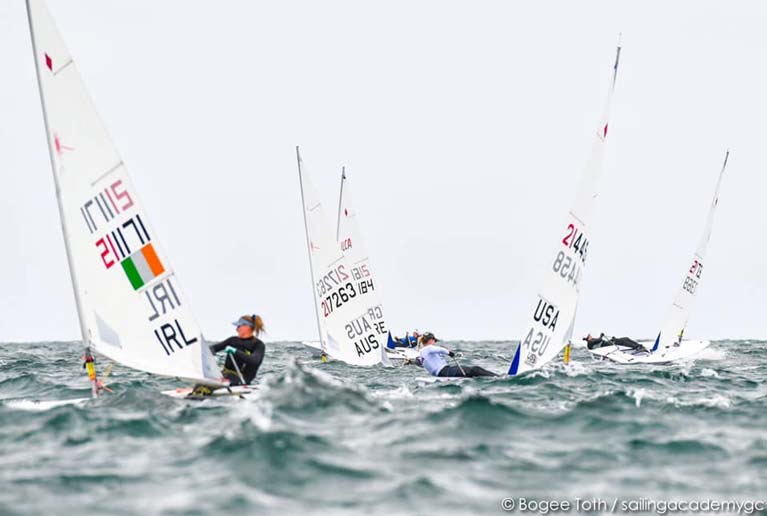 Aoife Hopkins (left)
Aoife Hopkins (left)
Highest ranked (39th) is Aoife Hopkins (21) of Howth Yacht Club who has campaigned consistently over the last two years, and will be targeting a second successive World Championship gold fleet result to maintain her selection hopes. Hopkins finished 25th in last month’s Sail Melbourne against quality opposition.
Aisling Keller
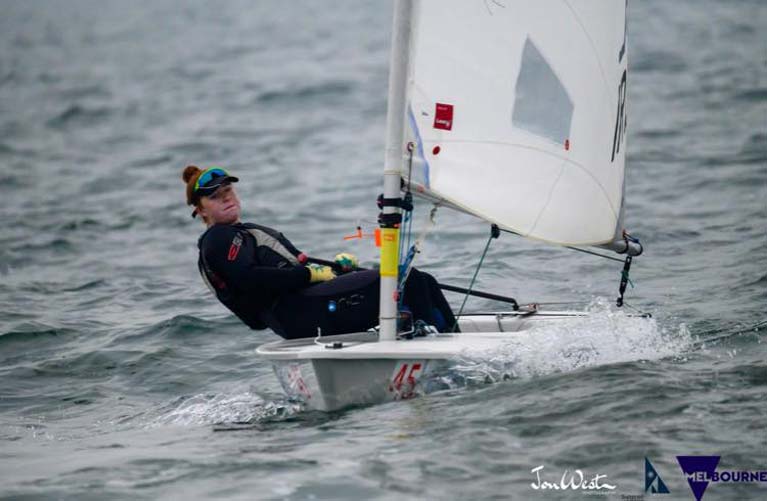 Aisling Keller
Aisling Keller
Lough Derg Yacht Club’s Aisling Keller (23), ranked 63rd, finished 3 places behind Hopkins in Melbourne, but two places ahead at last year’s Worlds, qualifying the country in the process. These pair were locked in a battle for the Olympic berth, but the return of Annalise Murphy to the fray has created a new challenge where they will need to look beyond their own private battle.
Annalise Murphy
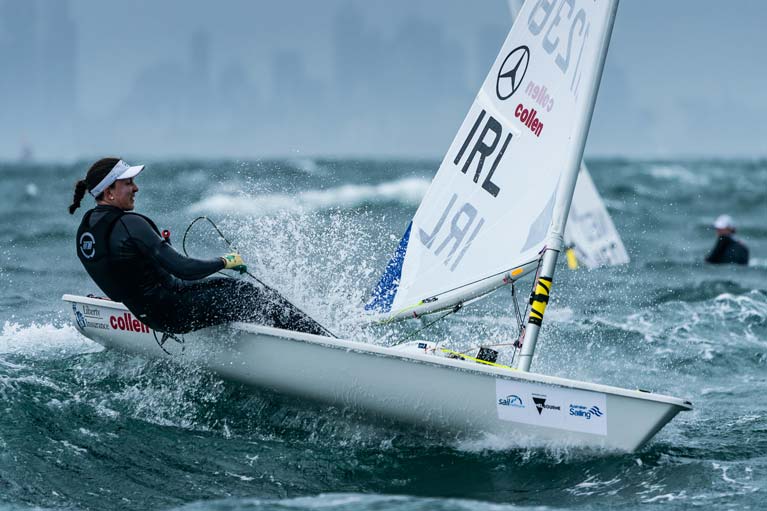 Annalise Murphy
Annalise Murphy
2016 Rio silver medallist Murphy (30), has a lowly ranking of 136th due to her late return to the class. The National Yacht Club sailor has directed her talent elsewhere since her medal performance, crewing in the Volvo Ocean Race and attempting to develop a 49erfx challenge. She took up where she left off, in battle with Rio Gold Medallist Marit Bouwmeester (NED) for honours in Sail Melbourne, once again taking the runner-up spot.
Eve McMahon
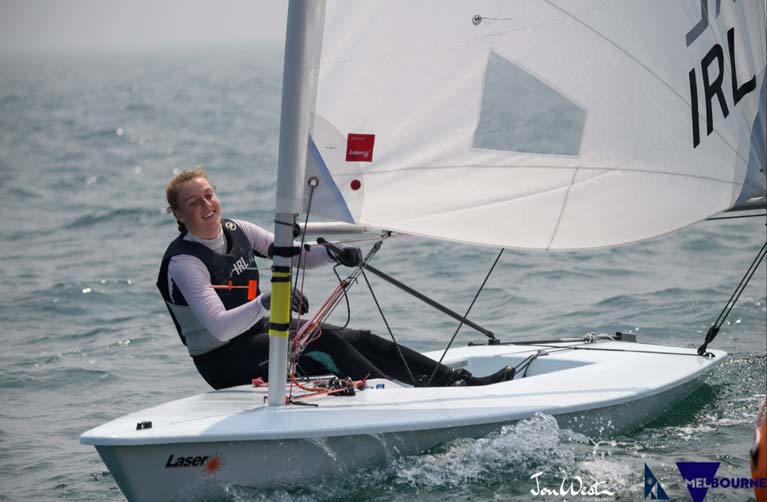 Eve McMahon
Eve McMahon
Eve McMahon (15), Howth Yacht Club, is the current under 17 Laser Class World Champion. Ranked 144th in the world, she has displayed her considerable potential by finishing 46th in Sail Melbourne and poses an interesting question as to whether her upward trajectory can put her in the mix for selection.
The weather will play a significant part in determining the outcome of this first trial. Sail Melbourne, with the exception of the final race, was a windy regatta, playing to Murphy’s strength. The forecast for the first three days of the World Championship, predicts mixed strengths, but perhaps closer to 10 knots than 15 knots.
First race reports on Afloat are expected on Sunday morning, Irish time.
All three medallists from the Rio Olympics will take to the water off Sandringham Yacht Club on Sunday. They head a star-studded field of 106 competitors from 40 countries, many of whom will be trying to qualify as their country's representative at Tokyo 2020.
Leading the charge will be Marit Bouwmeester from the Netherlands, the 2016 gold and 2012 silver medallist at the Olympics and a six-times world champion in the event. Marit has been training in Melbourne since December and won the Australian Championship in early January. Although she has already been selected for the Olympics by the Dutch Federation, she will still have a battle on her hands during the Worlds from countrywomen Mirthe Akkerman, Maxim Jonker and Daphne van der Vaart, who all pushed her during the Australian Championship.
Anne-Marie Rindom (DEN) is ranked number one in the world at present and is the defending world champion, having also won the title in 2015. She was 13th at the London Olympics and won the bronze medal in Rio.
Annalise Murphy (IRL) was part of an epic Laser Radial medal race at the London Olympics, where she missed out on the bronze by the barest of margins. She made up for that at Rio, taking silver behind Marit Bouwmeester.
Another former world champion, Alison Young of Great Britain, is currently ranked second in the world while Emma Plasschart of Belgium is ranked third.
Among those competing for a place at the Olympics are two Finn sailors, Tuula Tenkinen and Monika Mikkola. Ranked ninth and 14th respectively, they present a welcome challenge to the Finn selectors.
Even more intense will be the rivalry for Kim and Lin Pletikos of Slovenia, who are not only competing for an Olympic spot, but for bragging rights around the family dinner table.
The home crowd is also hoping to see a sailor selected for Tokyo.
There are 19 Australians in the field for the Worlds. Assuming there are no upsets, either Thomson or Stransky will need to finish in the top 10 to secure a seat on the plane to Tokyo
The Heat Is On For Ireland’s Quartet Of Laser Radial Sailors Competing For Tokyo Olympic Spot
In her latest column for The Irish Times, athletics great Sonia O’Sullivan meets the four women in contention for Ireland’s sole Laser Radial spot at the Olympic Games in Tokyo this summer.
After frustrations in her attempt to qualify in the two-handed 49erFX class, Annalise Murphy is back in the boat with which she won silver at the 2016 Olympics — Ireland’s strongest Olympic sailing result to date.
But this time there is tough competition from three women who were still coming up when she was racing for that medal in Rio — namely Aisling Keller, Aoife Hopkins and 15-year-old Eve McMahon.
All four have been training together in Melbourne, Australia since the start of the year, ahead of the Laser Radial World Championship (starting tomorrow, Friday 21 February) which will be the first of three chances between now and April for one of them to secure that coveted spot.
“Think about how that must be for them,” writes Sonia. “They know that only one of them will go to Tokyo so they wouldn’t be human if they didn’t have some sort of selfish instinct in them. It would be only natural for them to keep little bits and pieces that they’re learning back for themselves to give them a better chance of being the one who gets the spot on the boat.
“But they also know that the more they push each other, the better they make each other. And the better they make each other, the greater chance of a medal for Ireland and a better all round result for Irish sailing.”
Sonia also gets out on the water with Annalise to experience first-hand the speed and excitement of the Laser Radial — and the rush Annalise and her fellow challengers will be feeling when the training is done and the race is on.



























